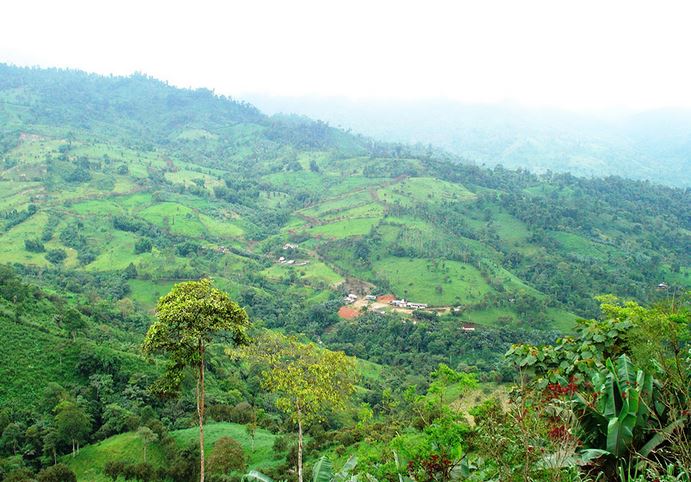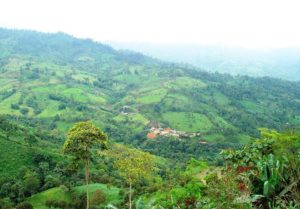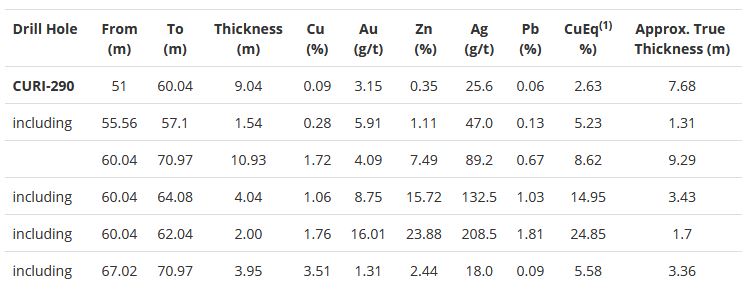Adventus and Salazar announce additional 2018 drill results at the Curipamba Project, including 15.39 metres of 5.21% copper, 10.39 g/t gold, 3.17% zinc, 55.81 g/t silver and 0.07% lead

 Adventus Zinc Corporation [TSX-V: ADZN] and Salazar Resources Limited [TSX-V: SRL] are pleased to announce additional drill holes from the 2018 infill drilling program on the El Domo volcanogenic massive sulphide deposit; which is part of the approximately 22,000-hectare Curipamba project located near Las Naves, Ecuador.
Adventus Zinc Corporation [TSX-V: ADZN] and Salazar Resources Limited [TSX-V: SRL] are pleased to announce additional drill holes from the 2018 infill drilling program on the El Domo volcanogenic massive sulphide deposit; which is part of the approximately 22,000-hectare Curipamba project located near Las Naves, Ecuador.
Highlights
- CURI-290 intersected 10.93 metres of 1.72% copper, 4.09 g/t gold, 7.49% zinc, 89.2 g/t silver, and 0.67% lead for 8.62% CuEq;
- CURI-292 intersected 27.47 metres of 3.03% copper, 6.26 g/t gold, 1.79% zinc, 35.0 g/t silver, and 0.04% lead for 8.33% CuEq; including 15.39 metres of 5.21% copper, 10.39 g/t gold, 3.17% zinc, 55.8 g/t silver, and 0.07% lead for 14.07% CuEq; and
- CURI-295 intersected 1.38 metres of 4.49% copper, 6.75 g/t gold, 44.23% zinc, 262.0 g/t silver, and 1.95% lead for 30.09% CuEq.
El Domo Infill Drilling Results
The first phase of infill drilling commenced in early March 2018 with the objective of upgrading the confidence level of the higher-grade portion of the open-pit constrained Mineral Resource by decreasing drill spacing. The Partners have now completed the first phase of infill drilling within the higher-grade portion of the open-pit constrained Mineral Resource with 8,587 metres drilled. A Phase 2 infill drilling program has now been kicked off for the remainder of the open-pit constrained Mineral Resource; which is anticipated to be completed in late fourth quarter of 2018.
Drill hole CURI-290 intersected a gold-rich zone of grainstone from 51.00 to 60.04 metres for an approximate true thickness of 7.68 metres that possessed resedimented clasts of massive sulphide mineralization and graded 0.09% copper, 3.15 g/t gold, 0.35% zinc, 25.6 g/t silver, and 0.06% lead. A subset interval of the gold-rich grainstone possesses higher-grade from 55.56 to 57.10 metres, grading 0.28% copper, 5.91 g/t gold, 1.11% zinc, 47.0 g/t silver, and 0.13% lead. Massive sulphide mineralization was intersected from 60.04 to 70.97 metres for an approximate true thickness of 9.29 metres, grading 1.72% copper, 4.09 g/t gold, 7.49% zinc, 89.2 g/t silver, and 0.67% lead. A subset interval of massive sulphide mineralization possesses significantly higher-grade from 60.04 to 62.04 metres, grading 1.76% copper, 16.01 g/t gold, 23.88% zinc, 208.5 g/t silver, and 1.81% lead.

Drill hole CURI-292 also intersected a gold-rich zone of grainstone from 56.78 to 62.28 metres for an approximate true thickness of 4.95 metres that possessed resedimented clasts of massive sulphide mineralization and graded 0.31% copper, 2.58 g/t gold, 1.27% zinc, 45.6 g/t silver, and 0.18% lead. The grainstone transitions directly into massive sulphide mineralization from 62.28 to 89.75 metres for an approximate true thickness of 24.72 metres, grading 3.03% copper, 6.26 g/t gold, 1.79% zinc, 35.0 g/t silver, and 0.04% lead. A subset interval of massive sulphide mineralization possesses significantly higher-grade from 61.91 to 77.30 metres, grading 5.21% copper, 10.39 g/t gold, 3.17% zinc, 55.8 g/t silver, and 0.07% lead.

Drill hole CURI-293 intersected well-mineralized grainstone from 63.17 to 66.67 metres for an approximate true thickness of 3.15 metres, grading 1.01% copper, 2.57 g/t gold, 1.41% zinc, 19.4 g/t silver, and 0.10% lead. The bottom contact of the grainstone is a well-mineralized fault zone with sulphide fragments that transitions into massive sulphide mineralization downhole. The fault was intersected from 89.15 to 91.53 metres, grading 1.44% copper, 1.47 g/t gold, 1.11% zinc, 16.3 g/t silver, and 0.04% lead. Massive sulphide mineralization occurs from 91.53 to 98.36 metres, grading 2.67% copper, 1.13 g/t gold, 0.05% zinc, 11.8 g/t silver, and 0.01% lead. A subset interval of massive sulphide mineralization possesses significantly higher-grade from 91.53 to 93.62 metres, grading 7.05% copper, 2.15 g/t gold, 0.10% zinc, 22.9 g/t silver, and 0.01% lead.

In CURI-295, a section of well-mineralized dacite volcaniclastic rocks was intersected from 69.75 to 78.84 metres directly above the massive sulphide mineralization. The mineralized section of volcanic rock has an approximate true thickness of 8.18 metres, grading 0.21% copper, 0.90 g/t gold, 2.37% zinc, 27.69 g/t silver, and 0.26% lead. The massive sulphide mineralization occurs from 78.84 to 80.22 metres, grading 4.49% copper, 6.75 g/t gold, 44.23% zinc, 262.0 g/t silver, and 1.95% lead.

Drill hole CURI-297, like CURI-290, CURI-292 and CURI-293, also intersected gold-rich grainstone from 44.96 to 52.43 metres, grading 0.06% copper, 2.75 g/t gold, 0.31% zinc, 12.1 g/t silver, and 0.17% lead. The semi-massive to massive sulphide mineralization is predominantly pyrite-rich with an approximate true thickness of 8.07 metres, occurring from 60.78 to 69.75 metres, grading 0.36% copper, 2.17 g/t gold, 0.81% zinc, 9.8 g/t silver, and 0.02% lead.

Drill holes CURI-291, CURI-294 and CURI-296 were designed to test the northerly limits of the known massive sulphide mineralization and further assess the pit wall geology. These drill holes all intersected favourable strata; however, no semi-massive to massive sulphide mineralization was intersected.
The locations of all drill holes referenced in this press release are shown on the Curipamba Project drill plan map, which is available on the Adventus website.
Metallurgical Program Start-up
The Partners are pleased to announce the retaining of Base Metallurgical Laboratories Ltd. (“BML”) for a comprehensive metallurgical study on the Curipamba project focusing on the high-grade El Domo VMS deposit. The work will be overseen by Tom Shouldice, P.Eng., President of BML at their Kamloops, British Columbia facilities. This study is expected to optimize metallurgical processes that will provide key information for future engineering studies. The 2018 test work was designed based upon a review of all historical metallurgical work completed on the project using conventional processing technologies summarized in the historical Preliminary Economic Assessment completed for Salazar titled, “Curipamba Project – El Domo Deposit Amended and Restated Preliminary Economic Assessment Central Ecuador”. This report was prepared by Independent Qualified Persons Gustavo Calvo Martin, M.Sc.A., P. Geo and Adam Johnston, B. Eng., FAusIMM (see Salazar January 22, 2015 news release). Results from the 2018 metallurgical study are expected to be received by early 2019.
Test work will be done using coarse rejects from the first phase of infill drilling on the higher-grade portion of the open-pit constrained Mineral Resource to provide three representative, mineralized composites totalling approximately 600 kilograms. All samples were vacuum sealed with a nitrogen purge to stop weathering and preserve the quality of the coarse rejects for test work.
Technical Information and Quality Control & Quality Assurance (“QAQC”)
The Curipamba project work program is being managed and reviewed by Vice President Exploration, Jason Dunning, M.Sc., P.Geo., a Qualified Person within the meaning of NI 43-101. Salazar staff collect and process samples that are securely sealed and shipped to Bureau Veritas (“BV”) in Quito for sample preparation that includes crushing and milling to prepare pulps that are then split for shipment to their facility in Lima, Peru for analysis. All assay data have undergone internal validation of QAQC; noting there is an established sampling control program with blind insertion of assay blanks, certified industry standards and sample duplicates for the Curipamba project. A QAQC program is also in place at BV and includes insertion of blanks, standards and duplicate reanalysis of selected samples. BV’s quality system complies with the requirements for the International Standards ISO 9001:2000 and ISO 17025: 1999. At BV, gold is analyzed by classical fire assay techniques with an ICP-AES finish, and both silver and base metals are analyzed by a 44-element aqua regia ICP-AES technique. Overlimit protocols are in place for gold, silver, copper, lead, and zinc.
Infill drilling continues to yield intercepts of high-grade, copper- and gold-rich semi-massive to massive sulphide mineralization within the open-pit constrained Mineral Resource update for the El Domo VMS deposit completed by Roscoe Postle Associates Inc. (“RPA”). The Indicated Mineral Resource totals 8.8 million tonnes grading 1.62% copper, 2.34 g/t gold, 2.42% zinc, 48.0 g/t silver, and 0.27% lead. The Inferred Mineral Resource totals 2.6 million tonnes grading 1.29% copper, 1.09 g/t gold, 1.51% zinc, 29.0 g/t silver, and 0.14% lead (see January 31, 2018 news release). The National Instrument (“NI”) 43-101 Technical Report was authored by Independent Qualified Person Dr. Lars Weiershäuser, P.Geo., of RPA (based in Toronto, Ontario, Canada) who is a Qualified Person as defined by NI 43-101.
Qualified Person
The technical information of this news release has been reviewed and verified as accurate by Mr. Jason Dunning, M.Sc., P.Geo., Vice President Exploration for Adventus, a non-Independent Qualified Person, as defined by NI 43-101.
About Adventus
Adventus Zinc is a well-financed company focused on base metals exploration and project development globally. Its strategic shareholders include Altius Minerals Corporation, Greenstone Resources LP, Resource Capital Funds, and Wheaton Precious Metals Corp.; as well as other highly respected investors in the mining business. The focus of Adventus is the advancement of the Curipamba copper-gold-zinc project in Ecuador as part of an earn-in agreement to obtain a 75% ownership interest. In addition, Adventus is engaged in a country-wide exploration alliance with its partners in Ecuador, incorporating two projects to date. Elsewhere globally, Adventus owns a large prospective mineral land package in Ireland totalling 1,950 km2 and, through its ownership interest in Canstar Resources Inc., is actively participating in the exploration upside of a prospective mineral land package in Newfoundland and Labrador, Canada totalling 550 km2. Adventus is based in Toronto, Canada, and is listed on the TSX-V under the symbol ADZN.
About Salazar
Salazar is a publicly-listed mineral resource company engaged in the exploration and development of new highly prospective areas in Ecuador. Led by a senior Ecuadorian management team and most notably by its namesake Fredy Salazar, this team has been instrumental in other major discoveries throughout Ecuador, including Aurelian’s Fruta Del Norte discovery, Mozo Deposit, Ex Newmont’s Cangrejos Project and International Minerals Rio Blanco and Gaby Deposit. Being an Ecuadorian-based company gives the Company a strategic advantage enabling the Company to complete exploration at a rapid pace. With an excellent property portfolio (6 projects – 33,383 hectares), good geopolitical positioning and a number of strategic corporate and financial partnerships, Salazar has positioned itself to be a strategic player in Ecuador.
For further information from Adventus, please contact Christian Kargl-Simard, Chief Executive Officer, at 1-416-230-3440 or christian@adventuszinc.com.
For further information from Salazar, please contact ir@salazarresources.com.
